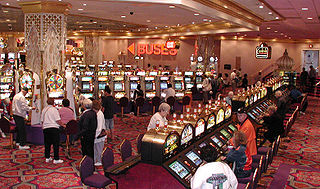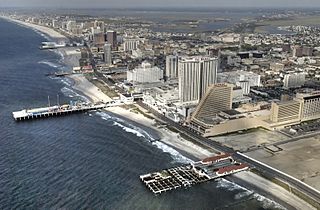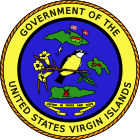
A casino is a facility for certain types of gambling. Casinos are often built near or combined with hotels, resorts, restaurants, retail shops, cruise ships, and other tourist attractions. Some casinos are also known for hosting live entertainment, such as stand-up comedy, concerts, and sports.

Native American gaming comprises casinos, bingo halls, and other gambling operations on Indian reservations or other tribal lands in the United States. Because these areas have tribal sovereignty, states have limited ability to forbid gambling there, as codified by the Indian Gaming Regulatory Act of 1988. As of 2011, there were 460 gambling operations run by 240 tribes, with a total annual revenue of $27 billion.

Lincoln Carter Almond was an American attorney and politician who served as the 72nd Governor of Rhode Island from 1995 to 2003. A member of the Republican Party, he was previously the United States Attorney for the District of Rhode Island from 1969 to 1978 and again from 1981 until 1993.

A racino is a combined race track and casino. In some cases, the gambling is limited to slot machines, but many locations are beginning to include table games such as blackjack, poker, and roulette.
Online gambling is any kind of gambling conducted on the internet. This includes virtual poker, casinos, and sports betting. The first online gambling venue opened to the general public was ticketing for the Liechtenstein International Lottery in October 1994. Today, the market is worth around $40 billion globally each year, according to various estimates.

In the United States, gambling is subject to a variety of legal restrictions. In 2008, gambling activities generated gross revenues of $92.27 billion in the United States.
Mobile gambling refers to playing games of chance or skill for money by using a remote device such as a tablet computer, smartphone or a mobile phone with a wireless internet connection. Over a hundred mobile casinos were operating as of December 2013, with most of the big casino operators in gambling now providing a mobile platform for their player base.

The Professional and Amateur Sports Protection Act of 1992, also known as PASPA or the Bradley Act, was a law, judicially-overturned in 2018, that was meant to define the legal status of sports betting throughout the United States. This act effectively outlawed sports betting nationwide, excluding a few states.
The West Virginia Lottery is run by the government of West Virginia. It was established in 1984 via a voter referendum. It is a charter member of the Multi-State Lottery Association (MUSL). The Lottery offers games such as Lotto America, Powerball, Mega Millions, and scratch tickets. West Virginia has reinterpreted the amendment to its Constitution that permitted its lottery to include casinos, and thus the West Virginia Lottery Commission also regulates slot machines, which are marketed as "video lottery" and available at several hundred businesses; and five "lottery table games" casinos.
Indiana law authorizes ten land-based or riverboat casinos on Lake Michigan and the Ohio River, one land-based casino in French Lick, and racinos at the state's two horse tracks. In addition, there is one Indian casino in the state. Other forms of legal gambling are the Hoosier Lottery, parimutuel wagering on horse races, and sports betting.
Gambling in Pennsylvania includes casino gambling, the Pennsylvania Lottery, horse racing, bingo, and small games of chance conducted by nonprofit organizations and taverns under limited circumstances. Although casino gaming has been legal for less than two decades, Pennsylvania is second only to Nevada in commercial casino revenues.

Gambling in New Jersey includes casino gambling in Atlantic City, the New Jersey Lottery, horse racing, off-track betting, charity gambling, amusement games, and social gambling. New Jersey's gambling laws are among the least restrictive in the United States. In 2013, the state began to allow in-state online gambling. Five years later, the state won a lawsuit that dismantled Nevada's monopoly on legal sports betting.
A referendum on legalising casinos and slot machines was held in Guam on 16 April 1977, alongside elections to a Constitutional Convention and the Board of Education.

Bally's Twin River Lincoln Casino Resort, previously Twin River Casino Hotel, is a casino, hotel, and former race track in Lincoln, Rhode Island, owned and operated by Bally's Corporation. The facility has 202,000 square feet (18,800 m2) of gaming space, with 4,108 slot machines, 97 table games, and 23 poker tables. The hotel has 136 rooms. Other amenities include a 29,000-square-foot (2,700 m2) event center, 16 eateries, 7 bars, and a racebook.
Legal forms of gambling in the U.S. state of Texas include the Texas Lottery; parimutuel wagering on horse and greyhound racing; limited charitable bingo, limited charitable raffles, and three Native American casinos. Other forms of gambling are illegal in Texas.

Gambling in Taiwan is prohibited by the Criminal Code of the Republic of China. State-run lotteries, like the Uniform Invoice lottery, are the only legal form of gambling on mainland Taiwan. The construction of casinos on some off-shore islands was legalized in 2009, though to date none have been built. Some gambling-style games are allowed either on special days or under special restricted circumstances.

A referendum on legalizing casino gambling was held in the United States Virgin Islands in November 1994, alongside general elections. It was a repeat of the 1992 referendum, which saw the proposal rejected by a narrow margin. This time the proposal was rejected in St Thomas and St John but approved in St Croix.
Legal forms of gambling in the U.S. state of Maine include parimutuel wagering on horse races, sports betting, the Maine Lottery, two casinos, and charitable gaming.
Legal forms of gambling in the U.S. state of New Hampshire include the New Hampshire Lottery, sports betting, parimutuel wagering, and charitable gaming. The state's Gaming Regulatory Oversight Authority (GROA) is part of the New Hampshire Lottery Commission, which also maintains an Investigative & Compliance Division.










